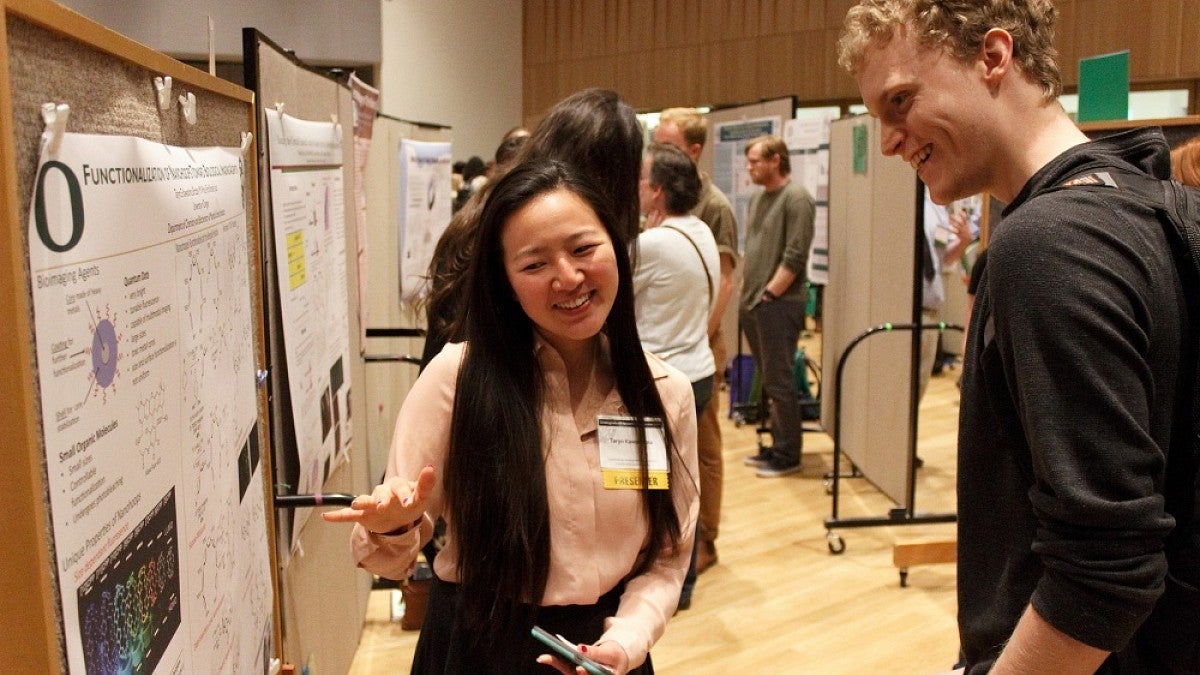The nature of research is there are always more questions to ask. That truth is a comfort to senior biology major Adie Fecker, whose thesis project on zebrafish social behavior won’t be where she had hoped by graduation. COVID-19 has delayed her lab work.
But at this year’s 10th annual Undergraduate Research Symposium, where Fecker will present this May for the third time, research in progress is always welcome.
“That's one of the great things about a symposium, as opposed to other presentations or speaking opportunities you might have,” Fecker said. “It's with the knowledge that this is a work in progress and you're never quite done.”
The event is set for May 21 and Fecker will have plenty of company presenting work in progress at the symposium, which draws hundreds of student participants each year. This time, though, it will be held virtually due to coronavirus precautions.
Given the disruption to the UO campus, organizers have extended the deadline for submitting abstracts to April 24 to give students more time to prepare.
Meanwhile, organizers are hard at work exploring ways to use YouTube livestreams and Zoom discussion rooms to facilitate online poster and research presentations, along with the dialogues they inspire. The goal is to mimic the accessibility and live experience of the symposium, but this new format may also offer advantages over an in-person event.
“The creation of multimedia presentations and live recordings will allow students to continue to develop their academic portfolios during a time when traveling to present at conferences is not possible,” said symposium co-chair Kevin Hatfield, who is also the assistant vice provost for undergraduate research and director of the Center for Undergraduate Research and Engagement.
Despite conference travel being out of the question, students’ reach through the symposium may be greater this year than ever before, Hatfield said. That’s because holding it online will allow full participation of local and international attendees, which could include family and friends, alumni, donors, high school students and teachers, prospective and incoming students, and even prospective employers.
Hatfield and other symposium coordinators are encouraging all students to submit research abstracts ahead of the April 24 deadline. Sample abstracts and resources to guide students through the writing process are available on the symposium website under the “Apply” tab.
Students whose work doesn’t fall into the traditional category of research shouldn’t hesitate to share their work at the symposium, organizers said. The broad range of presentations encompasses music and dance, social sciences, humanities, and art, as well as scientific study.
“Research is for everyone and can look so different and can be super fun,” said Momo Wilms-Crowe, another senior whose presentation will serve as her thesis defense this spring. Her focus is on food sovereignty in Puerto Rico.
Wilms-Crowe is a political science major and international studies minor who said research has given her opportunities to travel, meet inspiring people and individualize her education.
She said students in her discipline don’t always hear about research opportunities as easily as those in lab-based disciplines, but she wants to help change that.
“I definitely am always telling people about how cool research is and what it can allow you to do,” Wilms-Crowe said.
Students seeking advice can email the Associated Students for Undergraduate Research and Engagement at asure@uoregon.edu to learn more and get help.
Lab sciences are a good way to get involved in the research symposium, but participation can go both ways.
Attending office hours at the Center for Undergraduate Research and Engagement was how junior and human physiology major Nisha Sridhar got connected with the research lab that she’s been part of for nearly three years. Now her poster from a past symposium hangs on one of the walls in the lab.
“Once you have it in that form, it’s easier to share,” Sridhar said.
Accessibility to research is an important part of creating an impact. Past participants say they relished the opportunity the symposium provides not only to translate complex research into simple terms but also how it allows them to engage in their material in new ways through the questions asked by different audiences.
Nervousness is normal when preparing for one’s first symposium, but in subsequent years it became an exciting occasion for Sridhar, Wilms-Crowe and Fecker as they looked forward to getting feedback, as well as seeing the impressive range of work and the passion students shared with attendees.
This year, they will miss that buzz in the aisles of posters, but they are taking the opportunity to hone their technical skills in presenting information in digital formats. They plan to use the symposium as a resume builder and a chance to connect with a broad audience.
“I've been pretty impressed and inspired by what people can do using digital platforms,” Wilms-Crowe said. “So I am excited to challenge myself to see how I can still craft an engaging and meaningful experience through Zoom or whatever digital platform I decide to use.”
And, she’s excited that she'll be able to invite her mom to to her defense.
—By Anna Glavash, University Communications


